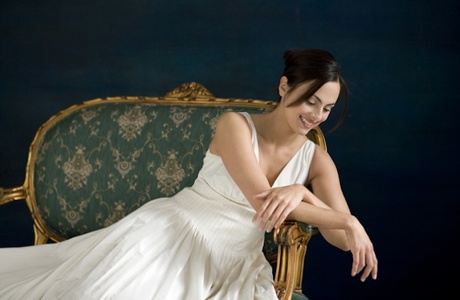by Paul J. Pelkonen

There comes a time in the career of an opera singer where, through either good fortune or exceptional skill, they rise from the ranks of the roster and ignite as a genuine operatic star. For the Isabel Leonard, 2018-19 at the Metropolitan Opera was that year, where the mezzo-soprano rose to the occasion in three major roles: Marnie, Melisande and Sister Blanche in Dialogues des Carmelites. On Monday night, Ms. Leonard capped a season which featured performances as Marnie, Melisande and Sister Blanche with a performance at Carnegie Hall, accompanied by the MET Orchestra under music director Yannick Nézet-Séguin.
The concert started with Mr. Nézet-Séguin leading the orchestra in Debussy's La Mer, a concert staple but not the usual repertory for the Metropolitan Opera's players. However, steeped (as they have been this year) in the French operas of the twentieth century, this three-movement set of sea pictures held no nauticual terrors. Mr. Nezet-Seguin obtained exceptional clarity from the strings, and brought the big horns in with subtlety and grace. The swelling first-movement climax came to its impressive peak, but the conductor and players seemed more interested in the delcate, diminishing notes that end the movement.
Debussy's achievement in this work was to establish his own orchestral voice, a concordance between the use of modes, the orchestral light and shade of Wagner, and the five-note scale that dominates Asian music. The freshness and originality of his approach never ceases to astonish. In the two following movements, Mr. Nézet-Séguin and his players navigated through the dance and play of dappled sunlight on the water, and the thunderous third movement, where the thematic climax of the opening movement comes back in a totally transformed way.
Ms. Leonard joined the orchestra next, for the Carnegie Hall premiere of Henri Dutilleux's Le temps l'horloge. This is a short set of five pieces, the composer's final work before his death in 2014. Dutilleux had a short catalog of works but his influence is long, and these quirky, fiercely inventive songs proved an ideal challenge for the singer. She was accompanied by inventive percussion, occasional bursts of harpsichord and shifts between developed themes and angular tone-rows in the titular "The Hours and the Clock", whose quirky orchestration reminded one of the first opera by Ravel.
The ensemble shifted into a dazzling set of complicated rhythms for "Le masque." Somber tones for the central "Le dernier poème". After a brief instrumental passage, the final song “Le futur antérieur" ended on an upward flight of fancy, as Ms. Leonard and Mr. Nézet-Séguin leapt together up the scale. In their capable hands, it was as if Mr. Dutilleux' last musical gesture before his death was a swift ascent into the celestial firmament.
The mezzo returned for the second half of the program which was entirely works by Ravel. Shéhérazade is a setting the heady milieu of the Arabian Nights as filtered through the French poetry of (here comes a marvelous pseudonym) Tristan Klingsor. The set opened with the orchestral fantasy "Asie," rich in detail and ornamental orchestral "Orientalism" filtered through the composer's magnificent eye for the smallest detail. Ms. Leonard rode the waves of orchestral sound as the listener's guide on the great Silk Road. The gentle, teasing "La flûte enchantée" was ideal for Ms. Leonard as was the closing, ambiguous "L'indifferent," a work that teases at the ideas of gender ambiguity with its taut rhythms and ambivalent, wandering themes.
The concert ended with more Ravel, the epic sweep of the Second Suite from his ballet Daphnis et Chlöe. This consists of three sections of the ballet, which in its entirety is Ravel's longest and most massive work. The slow, shimmering "Daybreak" rose up out of the orchestra to magnificent effect, rising to a gigantic climax in the brass that echoed the earlier magnificence of the Debussy piece. The central "Pantomime" offered opportunity for elaborate rhythms and colorful playing from the woodwinds. The surging "Danse generale" brought the concert to a swirling, stirring final climax.
Become a Patron!
Superconductor is free for everyone to read but it does cost money to produce. If you enjoyed this article, it's time to click over to Superconductor's Patreon page, and help support the cost of independent music journalism in New York City. Our Patreon program starts at the low cost of just $5 per month, less than a fancy cup of coffee in this town.

